|
Prosperity Christianity
Most of us do not want to quibble with theological stances within the umbrella of Christianity. However, the firing of the Chaplain of the House of Representatives for preaching fairness for all citizens, especially the poor and forsaken, causes us to pause. What is going on? Is the U.S. House Speaker accepting complaints by those who think praying for the poor is partisan and political? Why is justice and fairness a partisan issue -- and are these concerns from the ones who cater to the wealthy who support their right wing agendas? Has the American value of balance for all citizens been replaced by favoritism to wealthy donors? Must we quietly accept a "Prosperity Christianity," which for the majority of Christians is swindling masked by religious jargon?
Certainly the chaplain's prayers do not have to be "Christian," lest this becomes an established religion. But to remove someone because he prays for the poor is quite a stretch saying that the prayer is "political." Jesus Christ loved, blessed, served, and spoke for the needy and forsaken, as ought anyone practicing social justice within a democratic society. This is a broader American position than being Christian; it is the human thing to do. But what if the stance of some bought members of Congress is to love, serve and favor the rich. While not found in the Bible or for that matter in most religious traditions, it is the tenet of "Prosperity Christianity" (PC), a variation or cult that has certain ministers who have the ear of the President. Our nation is founded on the principle that all are created equal, though it has taken a long and painful time for that principle to be fulfilled.
The danger is that Prosperity Christianity is anti-democratic, for it champions the wealthy at the expense of the poor. Those who are rich for PC folks are those blessed by the Lord, and so the wealthier the leader, the more he or she is blessed and ought to be imitated. The bejeweled and wealth-laden minister conducts the equivalent to a Ponzi Scheme, namely, an investment swindle in which some early investors are paid off with money put up by later ones (ministers by laypeople in the pew), in order to encourage them to bring in others and become rich in the process. In such schemes only the top dogs profit for bottom ones are swindled.
The error in PC philosophy is claiming to be "Christian." It forgets that Jesus washed the feet of the Apostles in an example of service -- and died for us all while we were sinners. The path to material wealth in the Christian name is blatantly false and really the work of the Evil One; we pray daily to be delivered from such temptation. Here the battle of good and evil takes on stark reality, something we must be willing not to tolerate in any form of interfaith dialog. Prosperity Christianity is a product of our secular and materialistic society. This leads us to ask, Has Prosperity Christianity become THE established religion of our land?

The Carp River in late spring, St. Ignace, MI.
(*photo credit)
June 1, 2018 Participating in National River Cleanup Day
June is the time for sprucing up the natural areas where we will spend time this summer. Cleaning up our homes, tool sheds, study desks and work spaces is all general housecleaning and makes us more efficient people. What about the natural surroundings that we do not individually own but are part of the commons? A repeated principle (some would say a "rationalized statement to justify inactivity") is that those responsible for dirtying should be made responsible for cleaning. That raises the question whether the concerned and tidy citizen should clean up rivers. Should a citizenry that seldom catches litterers take responsibility here?
Some hikers will occasionally pick up trash and carry it back to dispose of properly, but it can be upsetting what others do through irresponsibility. We do not like picking up after others who, if caught, would be fined $500 for littering. This applies to trashing rivers as well as roadsides. It is especially true in Kentucky, which has more rivers than any other state but Alaska. For a long time in our part of America and unfortunately elsewhere, rivers have become a sort of sewer system with "dilution being the solution to pollution." "Out of sight is out of mind." Since carelessness can apply to both liquid and solid wastes, it obviously didn't take long to see what kind of damage raw sewage and litter could exact upon our wounded Earth. Such deliberate junking of the water or land environment opens the door to still further destruction; it renders landscape unsightly, discourages tourism, depresses the spirits of residents, erodes the sense of community, and harms wildlife.
Our rivers are treasures worth preserving in a natural state. However, pristine rivers need tender loving care just like hills and forests, a lesson learned by all volunteer cleaning crews. The junk cars and appliances are difficult to extract without heavy equipment, but the tires and beer cans, the garbage bags and diapers can be retrieved -- though it is tough and can be potentially dangerous work. Cleaning a river beset by carelessness makes us angry to the point of throwing up our hands in disgust. A redoubling of efforts to find the culprits and sentence them to become part of mandatory clean-up crews is what would be best, but is it really so easy?
Hopefully, future river damage will be less as total garbage pickup or accountability becomes mandatory. Learning responsibility takes time and effort on the part of all whether local or distant resource users. Preservation programs depend on the local cooperation of all citizens, since constant policing of isolated areas is out of the question. If volunteer cleanup crews feel incensed after picking up 4 million pounds of annual litter, they may consider helping to create long-term solutions. The litterer is the one responsible for cleaning it up; wrongdoers are to be detected, reported and made to clean up their mess. All said, a sincere thanks to those willing to help while we await greater responsibility.
Prayer: Lord, if cleanliness is next to godliness, then teach us to encourage all to help protect the gift of our beautiful rivers.

Cinnamon fern, Osmundastrum cinnamomeum, Red River Gorge, KY.
(*photo credit)
June 2, 2018 Promoting National Trails Day
Outdoor walking and hiking are satisfying for a wide range of people from toddlers to the elderly, even though pacing and time may differ; allowances may need to be made for those who cannot negotiate difficult routes. Folks in top condition target the Appalachian Trail or Pacific Crest Trail; many settle for shorter local paths that give shorter-term exercise and recreation. Whatever the trails chosen, all farsighted hiking enthusiasts see the need for a national trail system somewhat analogous to the national highway and Interstate systems. In this age of job-creation through federal infrastructure improvement, let's build a national trail system.
Why are trail-making and maintenance left to the volunteer clubs and non-profit organizations when such work is really in the national interest? We can possibly imitate our Native American cultural ancestors, who conducted visits to distant tribes and carried on commerce over a rather refined and extensive trail system; the traces of these are still visible. Bulk commerce is done elsewhere along with visiting through faster transportation modes. What about taking vacations starting near home? A national trail system could allow convenient access to relatively distant places without the risk of using dangerous highways. Trail use would have a low-carbon imprint, be quite refreshing, and be far less expensive, if trails are punctuated with low-cost camping locations. Certainly those calling for enhanced physical exercise ought to be pleased, for the chance to participate in outdoor activity in natural settings would be multiplied. Furthermore, trail vacations would be far less stressful and dangerous than using the busy highways.
The time for a National Trail Network has come. Let's now convince state legislatures and the federal Congress, which are fixated with such weighty matters as health funding and continued employment for those making advanced military weapons and luxury items. A well-developed national trail system would allow people to have shorter- or longer-term nature experiences in a less costly manner than parks and indoor recreational facilities. A national system would be fairer than a planned rapid rail system (in its present format), which only benefits the heavily populated corridor states. Still trail networks have economic ramifications; they can benefit outfitters, restaurant operators, and lodging managers.
The American Hiking Society (AHS) is already acting; its volunteer trail workers and maintenance crews are developing a mini-network. The Southeast AHS office at Chattanooga, Tennessee, has developed a detailed wall map of that region's existing and planned trails; ambitious hiking-trail network programs are using railroad right-of-ways for shorter trail systems in much of the country. National Trails Day makes us imitate the spirit of our pioneer and Native American roots and blaze a new network. Scenic trails are awaiting our promotion. Visit <www.AmericanHiking.org>.
Prayer: Jesus, who journeyed from Galilee to Judea and back on the trails of the Holy Land, accompany us as we promote trails today.

Fallen tree branch provides habitat for unidentified mushroom.
(*photo credit)
June 3, 2018 Building Up the Body of Christ
Let our praise be full and resounding and our soul's rejoicing full of delight and beauty, for this is the festival day to commemorate the first institution of this table... And so we, in accordance with his holy directions, consecrate bread and wine to be salvation's victim. (from Sequence of the Feast of Corpus Christi)
Today, we celebrate the Feast of Corpus Christi, the Body of Christ. For a majority of Christians this is a special celebration, because this is the heart of our community worship, the center of our focus, the sacramental presence of the Lord in our midst. We worship together and in doing so we are building up the Body of Christ; we are becoming a people bringing Jesus to others.
The Exodus account tells the story of how Moses sacrificed young bulls as a peace offering to the Lord; he sprinkled part of the blood on the altar and another part on the people saying, This is the blood of the covenant which the Lord has made with you in accordance with all the words of his. Sacrifice is at the heart of the mystery of the Old Covenant and of the New as well. Now we accept and enter into the sacrifice of Jesus on Calvary in an event that becomes eternal through its extension in space and time.
We gather together and celebrate, but that cannot possibly be a building up process when some have an oversupply of goods and others are denied the basics of life (a crime against humanity). We are resolved to do better. Within our holy and liturgical gathering we are called to share with each other in a spirit of gratitude or "Eucharist" and to remember the saving works of Christ. This commemorative act becomes a precious moment when past remembrance of sacrifice in sacred history and future anticipation of new life meet together in one time and place -- the NOW of our Christian lives. The Host (spacial unity) and the Liturgy (temporal unity) merge into a single oneness wherein we become united in the Body of Christ.
Furthermore, this table of divine and human meeting is the foreshadowing of our sharing at a world level when the past (history of human struggle) and the future (a more perfect Earth and future eternal life) come together at a present moment. Our gratitude is for gifts given in the past; our thanksgiving is expressed in "Eucharist," words opening up to saving deeds of which we are parties. We do not rest with merely saying "Thank you," but in going out and living the life we are committed to practice and improve. Our gratitude is expressed in present and future deeds, and the nourishment to do this comes in the Bread from Heaven. Thus our celebration is for actions undertaken in union with the Lord and in building up the Body of Christ.
Prayer: Teach us, Lord, about the mystery in which we participate; inspire us to give the respect that is due for the gifts given and in gratitude for the power to change a troubled world for the better. You make us builders of the future and give us the energy and motivation to do so.
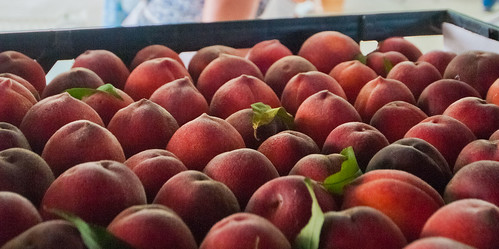
Peaces at the Bath County Agricultural Education and Marketing Center, Owingsville, KY.
(*photo credit)
June 4, 2018 Patronizing Tailgate or Farmers' Markets
Do your own gardening is our mantra, and yet some cannot garden due to physical disabilities or other circumstances. Sometimes we desire produce items we are not growing ourselves. Thus sources of fresh produce may be provided at the local level. Furthermore, many folks want to supplement their income, to grow veggies, and to be able to distribute surpluses. Farmers' marketing opportunities present themselves where one meets consumers, sell fresh materials at reasonable prices, share gardening experience, and avoid the shipping cost and carbon imprint of sending foods half way around the world. Behold the reasons for farmers’ markets!
Tailgate marketing can be a win-win situation. Locally-grown food is picked quickly and sold fresh; selling it directly within the community enhances the local economy; and purchasing consumers can have firsthand knowledge of the produce's origin. Once the bare structure of time, place and conditions has been established, the producer is relieved of part of the promotion burden; direct producer/consumer interchange eliminates the costly middle person.
Both producer and consumer can split the difference between wholesale and retail prices for quality produce. The atmosphere is most often filled with socializing opportunities: this is an easy way to discover what customers want and to teach consumers how to prepare less familiar vegetables and herbs such as kohlrabi or cilantro.
In Appalachia, the numerous individual roadside sellers offer some real bargains. However, a gathering of sellers in a designated market area can have advantages such as proper parking and a wider selection at a regular time. The ideal market location is crucial, for customers may get confused in trying to reach unfamiliar places. Marketing site selection is paramount: choose a location that is easily reached by the most people that is safe, has convenient parking, and where people feel at ease in making purchases. School or church parking lots can serve as marketing locations, especially when marketing during vacation periods or on Saturdays. Some places require licenses and market regs; they limit participants to local farmers and exclude opportunists wishing to unload surpluses.
Producers' time is valuable and thus limited sales periods permit more garden work. Quite often farmers' markets offer lower prices than supermarkets with comparable quality produce. Ideal markets are available to those with limited fresh market opportunities. Some consumers prefer programs that are subscription type purchases of produce known as Community Supported Agriculture (CSAs); here consumers sign up to receive from a producer, bags full of seasonal vegetables and herbs delivered to a preset place at specific times. This service is preferred to tailgating because it cuts marketing time on the part of the producer and consumer. The farmer comes, delivers, and is back home for a day's work. However, specific amounts of produce may be hard to deliver during droughts.
Prayer: Lord, help all our food producers to find ways of feeding the nearby and distant hungry and malnourished.
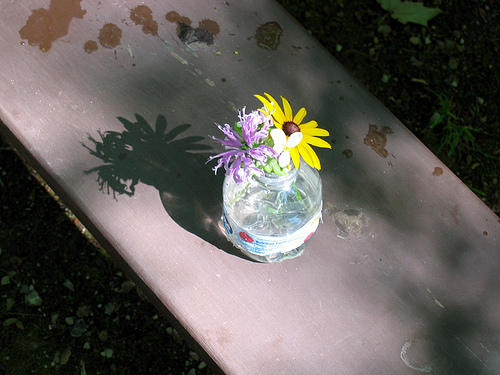
Fallen tree branch provides habitat for unidentified mushroom.
(*photo credit)
June 5, 2018 Learning to be Smart Campers
On World Environment Day we could talk about the global impact of our unsustainable living and expand our discussion to all areas of environmental practice where our carbon imprint is strong. Moreover, curbing past practices requires encouraging words about simpler and more enjoyable recreational camping methods. Here are some hints:
Take proper equipment. Nothing is worse than shivering with light weight sleeping gear. A tent should be able to endure bad weather to some degree -- but no tent is perfect. The mattress is important, even more so as we get older and seem to need more padding to permit a comfortable rest. Sufficient clothing is always helpful for protection against the cold or too much sun. A trusty flashlight comes in handy as does extra rope to hang backpacks in trees out of the range of night-stealing varmints.
Choose sites well. I have had a number of uncomfortable experiences, one notably in Washington state when, upon waking after a rain storm, we discovered that the tent was on the only dry island in a flooded low-lying camp site. Ensure the site is level so as to prevent downhill slippage; inspect the tent site well to get rid of stubble or rocks that can disturb rest. If possible, camp away from the crowd. Try to give yourself quality time and get to know the place upon arrival while it is daylight. Secure access to water and toilet facilities even though camping encourages modified routines.
Enjoy the evening. Campfires are nice at night, but many places are not allowing them due to pollution or fire dangers. Replace the old-fashioned campfire with a camp stove or a bright light to read by in the late evening. Or maybe it is time to savor the darkness and listen to frogs, crickets and the other night critters.
Cook simple things. If you are inclined to prepare meals at a campsite, nothing is more frustrating than trying to cook a dish only to find ingredients lacking. A far better approach is to bring the basic ingredients partly prepared before coming or to create very simple meals such as pancakes or mac & cheese, and to leave culinary expertise for your more furnished kitchen.
Be respectful of fellow campers. Nothing is more disturbing than campers staying up late, being loud, and forgetting that others are trying to distance themselves from urban noise. I confess to having been a past disturber and now regret it. Challenge noise makers earlier rather than later, and ask them to go elsewhere.
Prepare for insects. If you camp in mosquito country, bring netting and repellents. Keep the tent closed except when entering and leaving. My only desire to return to smoking has been when gnats get in my eyes while hiking and camping, for smoke is a good deterrent. But insects are part of camping worth tolerating in many ways. Do experience insect-free cool weather camping as well.
Prayer: Lord, inspire us to enjoy the great natural outdoors.
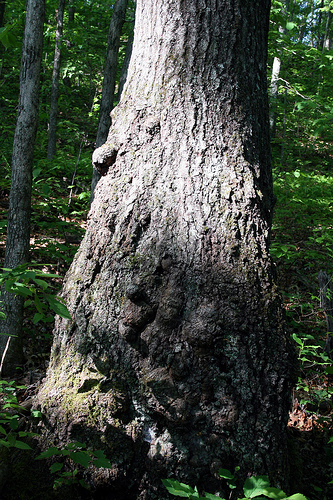
Chinquapin Oak, Quercus muehlenbergii. Rockcastle Co., KY.
(*photo credit)
June 6, 2018 Dealing with Poisons
Outdoor and indoor toxic substances exist, and people frequently come in contact with them during summertime vacations and other ventures. The chance meeting happens quite often unexpectedly and yet we must act promptly to assist the victim who eats a poisonous mushroom or has an insect bite that causes a severe reaction. In some cases the mishap will occur far removed from emergency medical assistance, and so the first aid may even be a matter of life and death if not severe discomfort. In nature we find more than the rash of poison ivy, which can be quite irritating to some. Certain poisonous mushrooms and other plants like laurel are around us at times and so, "natural plant tasters, beware!" Don't ingest what you don't know. I was known to taste plants, and an Israeli guide came up and told me, "I saw you taste wild fennel in Judea but, remember all green plants here in the Negev are poisonous."
Whether outdoors or indoors, some people get poisoned with some commercial substance either intentionally or accidentally ingested or touched. Clues must be recognized quickly: the condition of the victim as to what he or she responds to whether happened or is now occurring is important (not possible with the very young): the presence of poison container with warnings; the unfamiliar chemical odor; or some of the aftereffects such as dilated pupils or vomiting. The focus turns to what we non-professionals do immediately. Yes, call 911. They tell us that if victims are conscious, get them to drink water or milk. Don't give oils.
I saved my poisoned dog by forcing her to ingest a mixture of egg and milk. Save poison container and vomited material for analysis, and do not contaminate contents. For those becoming unconscious, keep airways open and give mouth-to-mouth resuscitation or cardiopulmonary resuscitation (CPR) if necessary. Do not give fluids in this condition; position the head of the victim so that vomit drains away. If the person is in convulsions, position the victim to prevent injury; don't try forceful restraint. Physicians advise us not to force hard objects or even fingers between teeth. If no medical help is around or one cannot contact an expert by phone, and if the overdose is a medicine, the best advice from the American Red Cross is to induce vomiting.
We add the normally advertized caution -- keep poisons out of reach of children, and yet we know the ability of the youngsters to "reach" is beyond our expectation. Some may advise storing anti-poison substances, but, except for Epsom salts (a laxative), they would be of little use. However, that is not advised after ingesting a strong acid, alkali or petroleum product. Commercial chemicals and unknown plants can prove harmful and even fatal. Respect more than just plants with white berries. Get rid of commercial poisonous substances -- this is good reason to practice organic gardening (no pesticides are around). Keep few chemicals at the domestic scene.
Prayer: Lord, make us aware that we are stewards of creation, which responsibility must be held with respect and care.

Squaw root, Conopholis americana, non-photosynthesizing parasitic plant. Hardin Co., KY.
(*photo credit)
June 7, 2018 Teaching Good Environmental Practice
Once I visited a first grade class in Milwaukee where the heroic teacher had persuaded all the students to grow beans in their individual pots at the classroom windows. This sense of doing things with one's hands was a low-resource way of training youth to the importance of making each person's environment better in itself.
In the last few years our American environmental consciousness has been on a fast learning curve: renewable energy is replacing the strong carbon footprint of past practices; families and communities learn to conserve resources and to live more simply; many strive to eat less meat; and grandparents recall the bad old Depression times when everything was reused until it was worn out. Today, a growing sense of outdoor gardening and exercise is opening doors to engage in more wilderness hikes and vacations. Some who are linked to agrarian roots see opportunities for urban youth to milk cows and pick fruit. Urban and suburban families learn as groups through growing gardens and harvesting the fresh produce.
Teachers, parents and guardians, together with youth, all are able to learn together. Today's youths have a greater awareness of environmental damage and need for improvement than we did over a half century ago -- and they can even assist elders in learning. Joint opportunities, such as cleaning up public areas, planting trees, using local materials for construction projects, and maintaining trails, abound. Nevertheless, unless steps are taken, exemplary school projects can become abandoned during summer months. On-going green practices are more challenging for schools than in homes because of shut-downs during critical months. Still teachers can give personal testimony to environmental practices (vehicles, foods, and entertainment choices); they can organize nature excursions, science fairs, and on-site demonstration projects. Coordinating the teaching with nature center visits can render a more holistic ecological experience.
Parents and guardians become true role models when they spend extra time talking about the local environment and global climate change, initiate recycling and resource conservation (water and energy) in the home, utilize all domestic space well, drive energy efficient vehicles, engage in gardening and edible landscaping, adjust diet of all family members, guide youth to green forms of recreation, take eco-tours, watch constructive and educational environmental programs together on television, and plan family vacations that become learning experiences for all. Cooperative family and teacher programs may include joint weekend projects with parents and guardians serving as chaperons for extended tours -- and these learn as much as the young folks. In fact, participating together is learning together.
Prayer: We praise you Lord, our patient teacher. Help us to learn still more while teaching others so that all of us can become part of an expanding experienced community of Earthhealers.

Scenic overpass along the Natchez Trace near Franklin, TN.
(*photo credit)
June 8, 2018 Sightseeing Values
Nine years ago today, three of us started a sightseeing and fact-finding trip to follow the route that Pere Marquette, Louis Joliet and companions took on their expedition of discovery of the Mississippi River system in 1673. Why such an auto trip? We were limited on the amount of time we could spend; we rotated drivers; the trip involved achieving educational goals; and in that case the trip included other requirements being fulfilled in its performance (attending a scheduled meeting). Furthermore, how else could we know what flora and fauna were observed by Marquette at this time of year?
Could all sightseeing be justified? Maybe not, but much can be said in its favor. First, sightseeing has unique advantages: it expands the mind through new experiences; it liberates us temporarily from our mental and emotional ruts; it is relatively low-priced compared with other forms of entertainment (except for fuel involved); and it produces less stress, if not trying to cram too much in too short a time. When sightseeing through walking, hiking, jogging, biking or canoeing eliminates fuel costs except the travel to get to some launching or pick-up points.
Some sightseeing can be done on public transport and can thus minimize non-renewable energy use. A bus or train heading to the desired location can be a good place to sit back and look at the countryside -- provided we choose to travel light and comfortably. Nothing will irritate the sightseer more than the little worries about baggage. Don't travel too light, for wearing uncomfortable shoes in place of those we left at home can also be irritating.
Sightseers must be refreshed. Settle details with companions before the trip starts. Discuss the journey in order that all know what to expect. Some may enjoy sitting at a cafe and watching crowds; others want to move on. Balance resting and moving. One may rest while another may chose a leisurely walk -- golden sightseeing opportunities as well. Reduce stress by avoiding crowded situations. Start very early in the day before everyone else stirs. If driving, road time may need to be limited so that drivers do not become excessively tired, for that can be dangerous. Another difficulty is that sometimes the sight itself may be distracting in a good sense; Interstate flower plots may attract and distract drivers.
Choose fewer locations so as not to crowd the itinerary. Forget about seeing everything. Spend quality time at a given place and see it intensely. I never saw everything in Rome; however on the only trip I ever made there, I spent a day accompanying the late Jesuit classicist, Ed Miller, who was doing academic research in the Eternal City. Ed invited me to go with him as he took pictures and notes on a limited stretch of memorials along the Appian Way. We didn't go far, but the day stands out in my memory, for I saw a small part of Rome in very great depth including Catacombs.
Prayer: Help us, Lord, to balance the urge to move about with the need to use all things including our travel resources wisely.
The Poor Will Rise
Bill Gates of Microsoft, Jeff Bezos of Amazon and Warren Buffet control more wealth than the 160 million poorest Americans combined.
Inequality is growing by leaps and bounds in this country and throughout the world. While many still suffer from heath, lodging or food insecurity, a few billionaires are privileged to pay relatively little in taxes and are treated as nobility without responsibilities. Their privileges threaten our democracy. This condition includes withholding financial resources needed to improve our fragile infrastructure (roads, bridges and ports), but it includes prolonging a fossil fuel economy that precipitates climate change leading to catastrophe in a few decades. How do we as responsible citizens confront this condition of inequality? This will be our major concern for the immediate future.
This inequality allows influence by the privileged to support candidates for legislative and executive branches of government who work for tax breaks for the wealthy. Warren Buffet paid $1.8 million in 2015 on a net worth of $87 billion, or 0.002% (or the equivalent of the average middle class worker paying $20 a year in taxes). Some of the privileged donate to "charity," a bribe permitting their immoral influence in a world desperate for more financial resources; they have the power to say what groups get their charitable largesse -- and recipients dare not question the status quo.
We can consider overcoming this perverse inequality through at least three options: a movement of the wealthy to give up their power; a mutual or tandem undertaking of rich and poor working together; and through the option that the poor take what is rightfully theirs; this final approach includes effective legislation where all pay fair taxes. It sounds so simple but how does this come about? In reality, none of the three options appear at this moment to be easily achievable given the present condition of the world -- but changes are possible. Some may spend time with the wealthy in hopes they can effect change from within their ranks of privilege, wherein the improbable initiation or cooperation with change agents occur. Mere persuasion by those without monetary influence is highly unlikely given the greed in our culture.
First option. Believe me, why should the privileged few make a change of heart if not forced to do so? With immense effort the moral idealist may convert a fraction of the few to change heart, but if that is a free option then a great number of the privileged secularists will smile and continue their practices. Furthermore, to expect a free relinquishment of wealth is based on the false premise that change is in the control of the wealthy and not the democratic people. The current condition is itself immoral, since the wealthy do not pay their share of taxes (during the Second World War the rate was 94% and conditions are just as serious today). For the motivator this demands pretending and kowtowing to the privileged, who are thus recognized to be the power in which change is reckoned. Pretending that this is the proper procedure misses the distinction that many are heavily taxed and are caught up in the mantra "no new taxes," thus allowing the super-wealthy to continue in their perverse game of hidden violence to the poor.
Second option. Simultaneous giving up by the wealthy and taking by the general citizenry is just as improbable as the first option. At least it admits part of the process includes the exercise of democracy. Though the ideal sounds good and worthy of introduction, it does not address the epidemic of greed in which the poor still think they can be somewhat like the privileged through their chances at plentiful lotteries. Sharing may be great and effectively operating in some primitive societies, but our cut-throat culture seeks the success through competition -- and losers hope for a better day. Just like the first option that has a grand ideal, so all the more does this second option -- but the pressure of current conditions work against it. Those who advise citizens to be patient and await change implicitly affirm the status quo.
Third option. Through the inspiration of Mary's Prayer (the Magnificat) I have opted for the third approach -- the rising of the poor to take and not to wait. It is biblically based and worthy of consideration as the alternative to prosperity Christianity (wait and be as good as the rich leader). Here the power of God is ever more manifest in how the undertaking must be affirmed. This option manifests an urgency to change now so that universal adequacy of food and health can be experienced by all through a proper exercise of democracy. We must arouse the poor to take what is rightly theirs -- but not do so in a violent fashion unless perhaps there is no other recourse. However, this violent possibility is discussed in an upcoming essay.
Arousing people to take what is rightfully theirs is a delicate task but a necessary one. The "theirs" does not mean each individual will benefit in a competitive manner from the wealth that is to be redistributed. It means that "theirs" is a commons of which each must share according to need -- in the sense mentioned in the Acts of the Apostles (4:34-35) as a manner of receiving from the available resources. Since our culture is one where greed has been rewarded, this distinction will be hard to introduce, though younger folks may find it easier to accept than older ones. Again, the challenge is for the poor to rise up and take what is communally ours and to do so in a non-violent manner -- but to show urgency and holy impatience in our calling for change.
My only regret is that I do not have enough time in my mortal life to see this to completion. However, if I can influence a few, especially younger citizens to undertake this role, it is the best I can do with limited influence and fading energy. Urgency clashes with manner of approach and both haste and willingness to change must be tackled together. Our hope is that others will see the need to act and be energized to do so, for change is absolutely necessary if we are to remain faithful to our human calling.

A cluster of small mushrooms make short-lived appearance in garden planter.
(*photo credit)
June 9, 2018 Rethinking Our Rest Time
As I age I notice that leisure time evolves in meaning, variety and duration. What constitutes leisure is different from the strenuous activities of yesteryear; today it is less active and more restful. We don't have the energy to enjoy the same leisure activities as infants, youth and even the middle aged. Time is running out for us, and so we must run, but be willing to take more rest stops along the way. It is becoming clearer that rest is part of the rhythm of life; it needs to be balanced with our activities even when they slow down. I used to think we all need eight hours of sleep, and maybe that is true of the stressed and overworked -- and some who simply need more sleep. But to place rigid requirements is unwise, even while many do need more sleep than they admit.
Our life is not a seesaw between the lazy one's inactivity and the hyperactive one's busyness. With more leisure time we need fewer alarm clocks and schedules. While tending in the past to be overactive, I never ever burned midnight oil for any reason. Nor have I ever taken a sleeping pill of any sort. Needed rest is taken on a regular basis and extra rest is taken on rare occasions.
People should be divided into night people and morning people, and maybe a certain segregation should be made accordingly. Too often the night people keep the morning ones awake when they want to sleep, and the morning folks stir the night ones when they want to continue sleeping. Being a morning person means we rise well before the sun, when the energy to start acting overpowers us. But then we wane long before the night folk at eventide. The intolerance of our country for morning people is deeply felt, but night people may say the same thing -- for all I know.
When sitting in an airport or at a stop light, I see the next person is busy dialing and talking with someone about virtually nothing. Can't they just sit and do what the old southern lady said, "Sometimes I sits and thinks, and sometimes I just sits"?
Resting has a particular place in the overly active person's life, for that is the time to let ideas germinate, and to pray for the light to move towards major decisions in life. We need rest time, and yet far too many folks get far too little of it.
We are not God, but finite ones. If God rested on the Sabbath, we should rest as well. We learn in life that our activities are best performed when the rest component has been honored. We can tell when others need rest by their facial features and shadows under the eyes. Some of the sleep-deprived regard their condition as a matter of status; but it may be poor planning. Let's value our resting periods more. In rest we crave eternal bliss; rest assures us that we are living in a harmonious manner; rest is what the restless can deprive others of in order to have companions -- but don't let them.
Prayer: Lord, teach us that rest is golden, energy-building, blissful, and, most of all, necessary. Teach us that rest for us active folks is preparation for eternity.

First Nations carved totem, near Prince Rupert, British Columbia.
(*photo credit)
June 10, 2018 Battling the Powers of Evil: Opioid Addiction
Anyone who does the will of God, that person is my brother and sister and mother. (Mark 3:35)
Amid the constant battle with the powers of evil, we are always comforted in knowing we are doing God's will; this allows us to remain closely in the Divine Family within a frightful world. As during the life of Jesus, some will try to characterize his followers as crazy or tending to be troublemakers -- but Jesus remained and his disciples remain steadfast. Yes, "Onward Christian Soldiers."
We are confronted today with evil in many ways. One of these is the Opioid Epidemic that is considered a national emergency with little chance of abatement in the near future. Opioid is a class of so-called "pain relievers" that should have never been legalized and prescribed; they lead to other more severe drug use, and this is now causing about 50,000 overdose deaths each year in this country -- and mounting. Recall that this class of prescribed pain-killing drugs has proved profitable to Big Pharma. Really, opioids have been killers and caused pain to the thousands of victims' families and friends. The addictive nature of various drugs is generally overlooked; perhaps persistent litigation by victims may reduce their presence. America has become a victim of its tolerance of greedy profiteers and for advertising medical drugs, which is not the case in other developed nations; the U.S. has a major drug problem.
Evil exists though the devil tricks people into thinking he does not. In the Our Father we ask God to "deliver us from evil," though a more proper translation is the Greek masculine "evil one." We need to see that this opioid epidemic is the work of the evil one as much as many of the other evils that befall our fair land. We need to see the evil in its immensity and to seek the wherewithal to avoid such temptations and help others to do the same. At times I feel powerless in any local attempt to tackle the opioid epidemic within my parish boundaries, with its personal battles that so often are lost. The problem is more than local; it is regional and national and takes physical and spiritual resources to confront and conquer.
We end any discussion of evil knowing of its reality and pain, and yet seeing it as an ever-present problem. Yet, in confidence we know that as a believing community we have God at our side. God is our light and salvation -- and thus disaster of a physical or social nature cannot ultimately conquer. In many ways, we avoid talking too much about evil and regard such talk as old-fashioned and a part of a by-gone hell and brimstone tirade. But evil does exist in many forms, and we are called to address it beyond our personal struggles. However, once in a while we face the problem of evil and the power of the Evil One to lead folks astray. Let us humbly seek God's help.
Prayer: Lord, you are our salvation and we need you to help us resist evil and assist others who are under the influence of the Evil One to do the same. Stay close to us.

Common garter snake, Thamnophis sirtalis.
(*photo credit)
June 11, 2018 Returning Phoenix: Nuclear Power
Proponents of nuclear power continue to dangle the promises and enticements of nuclear energy before the general public. Why? The answer rests in the inability of the nuclear industry to make a "profit" without heavy governmental subsidy of technical development, construction, insurance and ultimate disposal of waste materials. When $50 billion in funding is sought from the federal government, we should look carefully at this taxpayer waste and national security problem. Nuclear power must be phased out because--
* Nuclear power is expensive -- Far from early claims that this source would be too cheap to meter, this would be an expensive source if all costs were borne by the industry itself. Each new facility will cost over ten billion dollars and counting. Only government subsidies can make nuclear power "compete" with other fuel sources;
Nuclear power is not needed -- Sure, we need non-carbon emitting fuels, but solar and wind with equal subsidies can easily replace any demand for risky, costly and technically sophisticated new nuclear powerplants. Let us not forget that a serious effort at energy conservation would save this country any need for new powerplants for at least a decade - the precious reprieve needed to move over to a truly renewable energy economy;
Nuclear power is risky -- The safety guarantee is not perfect no matter how much improved the engineering. The waste materials still have to be disposed of properly and that problem has not yet been solved. The threat of terrorist attack is always present;
Nuclear power has consumed fossil fuels -- Don't kid yourself about nukes. Nuclear power has actually demanded fossil fuel energy sources to dig uranium ore, process material (one of the heaviest users of electricity generated from coal was the now closed Paducah Kentucky enrichment facility), build the plant structures, transport materials, and eventually dispose of the waste. To present this as an alternative to fossil fuels is fallacious and misleading; and
Nuclear plants are potential sources of bomb materials -- With all the recent controversy over North Korea and its bomb-making capability, we must realize that civilian nuclear facilities have and will continue to be sources of weapons-grade materials. We should not approve of nuclear energy production and subsequent acquisition of weapons-grade materials by rogue nations or terrorists.
Alternatives are green -- Wind and solar, the fastest growing energy sources, are green and far safer than nuclear. The only thing windy about nuclear power is its claims, and these fail to stop cost-overrun multi-billion dollar nuclear plants, two (in South Carolina) of four being built were canceled in 2017 and others problematic.
Prayer: Lord, give us the courage to tell things as they are, and to continue the practice of opposing nuclear power facilities.

Rural western Kentucky farm in June.
(*photo credit)
June 12, 2018 Juggling and Multitasking
Jugglers gain our admiration and applause, for they do things many of us find extremely difficult. I admit I can't juggle one object well, much less many. My only unique ability is to balance the end of a garden hoe by my little finger and walk a fair distance; so much for unusual skills, but perhaps we sell ourselves short. Napoleon would simultaneously engage a half dozen writing assistants by walking around to each and dictating six different letters as fast as each could write; he was a mental juggler.
On second thought, we all do some juggling, and yet either we do not recognize the skill or are too embarrassed to brag about it. We may not flip objects into the air and catch them before admiring onlookers. Our juggling may be more serious and requires another type of dexterity. My mother, as housewife, cook, food canner, chicken raiser, vegetable and flower grower, cow milker, entertainer, tobacco growing assistant, berry picker, euchre player, and listener, could out-juggle anyone I've ever seen. With a food turner, she could chop up already boiled potatoes for frying in a hot skillet while talking or listening to others -- and do other things at the same time. Now that was juggling. She never hesitated to rise early and also at any time of night, if anyone needed help.
We all inherit some multitasking skills from home life or school work. We may work on several ideas or books or special projects all in the course of the same day and never regard this as juggling. Some of us have more than one job and that takes juggling schedules; others will drive and eat and listen to the radio and maybe even talk on the cell phone all on the same jaunt to or from work -- this last feat should be outlawed, for it results in inattention on the road conditions. Others of us will meditate and do routine exercise simultaneously, or read and eat a meal at the same time -- better than doing them as a driver in congested traffic.
Looked at in this broader sense, we juggle but may not do so efficiently? We may hide the practice from others because they expect greater demands from us in one or other area of our work. Certainly multitasking, while attempting to study or to concentrate on a needed task, is virtually impossible. Teachers and employers may rightly expect more. Does our spiritual life get proper attention when we juggle the cares of life throughout the day and night? Do we take time off and rest and simply abandon the juggling act so as to give time solely to God? Juggling can be entertaining, challenging, demanding, and skillful, but it can also distract us from issues requiring greater concentration. We can especially highlight busy parents of youthful families, but shouldn't we think twice about imitating them. It is far better to evaluate our use of time and ask about whether we have a healthy balance in activities. We need time just to drive, rest, read, study, or pray. Hear the porch sitter: "Sometimes I sits and thinks; sometimes I just sits."
Prayer: Lord, give us insight into when to rest and when to act, and help us to devote enough time to each in its own turn.

Sheltowee Trace, Daniel Boone National Forest, Powell Co., KY.
(*photo credit)
June 13, 2018 Respecting Church/State Separation
We Americans take our separation of church and state seriously. We do not want an established privileged church and we respect the rights of citizens to worship as they deem best without state interference. Church and state do meet and even clash on occasion. I have offered prayers at the Kentucky House of Representatives on a number of occasions. Church institutions accept state fire codes and building regulations and comply with norms for the common good. To allow workers in justice to have one day off, harks back to "blue laws" requiring one free day a week; these were imposed in former times. However, how far should cooperation go? Should we install illegal devices to deactivate cell phones in the interior of church? Should we shelter or should we expose illegal aliens? Should church- related snake handling be outlawed? Should we denounce rampant materialism within our consumer culture?
All said and done, we generally approve of those who protect our separation of church and state, provided they do not harbor hidden biases that seek to deflate the right of the Church to speak on matters of faith and morals. On the other hand, church speakers who imply that those who vote for or against certain candidates have improper intent and ought to be cut off from a church community may transgress the delicate separation boundaries. The deliberate targeting of religious places as partisan political stations is where the separation seems to get mixed up -- though the Church must speak out on moral issues that have political implications; furthermore the state must defend the rights of all citizens. The abortion, embryonic stem cells and same-sex marriage issues involve different degrees of legislative, judicial and executive activity as well as church-related demonstrations and pressure. We recall the nineteenth- century anti-slavery movements, which were church-inspired, and recall the American Revolution had church support.
Separation of church and state takes on a new dimension in the twenty-first century with Moslem groups demanding certain restraints on people in the press, or the freedom (in France) to wear certain clothing and religious symbols in secular schools. Sikhs want waivers on American military dress codes to allow bearded soldiers to wear turbans. Federal prisoners report that Christians are not allowed to wear rosaries, although others can exhibit their religious symbols. Each case deserves fair treatment. The current federal Faith Initiative also tests the walls of church and state by asking who is employed at the subsidized organizations. Religious school vouchers are allowed in some places and denied in others; certainly it seems fair for student safety that proper transportation, health benefits, and protection be provided. What is interesting in all these issues is that church/state separation is a dynamic process, not a stationary wall that avoids reexamination and modification.
Over and over we are aware that the political touches on morality and religious practice have political implications.
Prayer: Lord, help us to recognize the principle of separation of church and state and encourage continual refinement.

Eastern tiger swallowtail, Papilio glaucus.
(*photo credit)
June 14, 2018 Celebrating Flag Day
Though I do not generally fly flags or banners, I like to see them flying from neighbor’s front porches and entrances. Certain fluttering cloths are quite colorful, are adapted to the seasons, and give a sense of cheer to the entire domicile. Residential flags tell about the resident's willingness to communicate with others. Thus these home flags become distinctive symbols of the owner's individual personality. Quite a few commercial and other institutions afford the flag a prominent place on their own grounds. Often this demonstrates a type of patriotism, saying, "I'm a true patriot; are you?" Over the years many in the military have died or suffered injuries from keeping the flag flying in fierce battle; others returned in a flag-wrapped coffin; still others had their hearts stirred when they saw the flag flying during or after a calamity.
Some commercial businesses fly some of the largest American flags imaginable with massive flag poles to keep them flapping in the breeze. It is their mark of solidarity in this time of national conflict and global terrorism. Since the custom of taking flags down at dusk has lapsed, current proper etiquette says that these flags ought to be flown with a light beaming on them. This is not always the case, but it ought to be done.
In 1976 I lived in Washington, DC, on the 200th anniversary of the Declaration of Independence; I observed a flagman on the roof of the Capitol building running flags up and down the pole. Undoubtedly a number of people wanted a "flag" that flew over the Capitol on July 4th, 1976, but what did one second of flying mean? Sometimes our flag waving has about as much significance as that hyperactive flagman's work. We want to be seen with a flag, but spend little time regarding the significance of flying it. Yes, we should show the flag, if we want our land to be free and our outreach as a nation to be caring for democratic aspirations and well-being of all people.
Let's celebrate Flag Day by asking some searching questions: do we really want everyone to vote or are there unjust barriers to shut out the poor? Are the causes we fight for true causes or mere subterfuges for those who want to make profits out of our land? Are we truly expressing freedom in what we do as a nation? One of the best ways of celebrating this day would be to read John Perkins' book, Confessions of an Economic Hit Man. This tells how bankers, business persons and governmental workers wrap themselves in Ole Glory and yet undermine the welfare of the poor and indebted nations of the world. We need to see how our lack of regulations has led to situations that only cause more misery to some of the most indebted lands. In 2018, let's celebrate Flag Day differently; let's reflect on how we allow administrative reduction of regulations and failure to support climate change efforts to undermine our national democratic efforts. We need to flag profound change today.
Prayer: Lord, teach us to avoid empty forms of national symbolic actions, and still see that we as a people have a proper role to play in healing our troubled world.
Change to Equality: Think Poor Folks
The status quo of current privileges of low taxation for the wealthy is itself violence of the most perverse fashion, but this is hidden from many citizens. Every time an individual or family cannot obtain essential health care or must present a hungry child with a meager meal injustice is done; inaccessible health and food insecurity are violence, though hardly recognized. Victims of such violence are handicapped to some degree because if they strike out in desperation they will be declared "unworthy" of assistance, and thus this becomes an excuse to continue the status quo.
Solidarity. We cannot separate ourselves from the poor or those who lack the basic essentials of life. Our individual and social salvation is at stake. We must share when one has a surplus and another lacks essentials; it is the human thing to do. Those who are eager to share soon find that their individual willingness is not shared by the great majority, and thus they appear at first to be powerless to make the change unaided by others. When we enter the struggle and see our own insufficiency in solving the problems then we are invited into the pain of the destitute in some way. The more we are committed to accepting this challenge of profound change, the more we experience our poverty. It is this solidarity with others that becomes the cement of bonding that is absolutely needed to stop us from calling the poor "they;" we discover a "WE" that includes all who want to share the commons as expected by our Creator and are willing to do something about it.
Simplicity. WE must freely choose to live a simple life that enhances our solidarity with the poor. Simple living is part of being poor: conservative heating and cooling techniques; simple diets with low processed foods and scarce meat content; curtailed travel and public means of transportation where possible; and simple forms of entertainment, etc. Living with the poor makes one "think with the poor;" this includes lower economic expenditures. The anticipated radical change cannot occur without an atmosphere of simplicity. Making this a voluntary option while allowing the wealthy to retain their privileges was the 20th century's gravest mistake. There's constant need to economize; there's a need to conserve resources; and there's a need to work with others. All three of these (realistic economy, conservative resource use and collaboration) are truly necessary if an authentic revolution is to occur and bring about a just equality in resources.
Leadership. Where then must we find leadership among the poor? This must occur when people are willing to "think poor" in the manner of life. If the poor are to lead a revolution to bring essential needs to the destitute and to preserve our democracy and planet, then how are they to act in a non-violent manner and still remain in solidarity with all the poor in the process? The amount and quality of food, the restrictions on entertainment and travel, and the lack of air conditioning are all part of living with and among those who must on occasion beg for food. This is quality time spent recognizing humbly that ultimate power comes from above.
Characteristics of change agent. What qualities of leadership make this change possible? First, the ultimate goal must be kept foremost in mind, for the work is difficult and the temptation to excuse oneself or to escape into an allurement is enticing. Awareness of the goal is a singular concern, but we must constantly remind ourselves that tempting detours will undoubtedly occur. But there is more: the manner of bringing about the change must be not personal gain or honor but a basic humility and honesty that comes to humble workers in the field. The question of non-violence again raises its head, but if through efficient action this can be done with regard for the dignity of all participants then much can be gained by a gentle revolution.
Fair taxation. Change is not some mystery that is still to be invented. It has been effectively tried in various times and proved successful (such as the American approach in the Second World War). There is no need to raise the taxes on the middle or lower class but rather on the privileged few who control over half the wealth of this country and world -- and 90% of the profits at the latest count. Simply imposing fair taxes on all would solve the problem of need, for necessary work is plentiful, ability of workers to have meaningful employment is present, and the resource shortage could be adequately fulfilled. There is nothing violent about a citizen's demand that all be fair and pay their dues.
"No more taxes" scam. When a nation becomes so gullible that the masses chant the mantra "no new taxes," they are obeying the wishes of the privileged few -- who are getting away with murder. The chant rings hollow, but do candidates have time to listen and find ready donors in the wealthy who want them to go along with the chant? The grave difficulty is that the candidates who ought to be discerning are beholden to libertarian ideas of everyone having inviolable personal rights -- and the rest be damned. Should we ask whether social libertarian rights of the child-bearer or others have precedence? The battle over the rights to private property of whatever amount is part of this same discussion.
Divine assistance. The poor, including change agents in solidarity with the general citizens must recognize their inherent powerlessness in the face of inequality and immense wealth. Some may attempt to fool themselves to say that power rests in the united people but all too often imperfect agents frustrate that union -- as past social movements have often shown. Here those of spiritual inclination have a role to play, for they know that all power comes from above and is exercised in union with the Divine. The Communist attempts of the 19th and 20th centuries and the secular Capitalistic responses of that period were lacking and resulted in autocratic rule or undue influence by the wealthy. This 21st century demands for us to profess a need for equality among people before the face of the Almighty, the source of human power. Without such an acknowledgment, activists will struggle among themselves and permit the unjust status quo to continue.

Experimental tobacco plants, Pin Oak Farm, Univeristy of Kentucky.
(*photo credit)
June 15, 2018 Deriving Safe Pharmaceuticals from Plants
Last year, National Geographic (Sept. 2017) ran an article "A Weed that Busts Bacteria." It was about the berries of the Brazilian pepper tree, an invasive plant in the southern U.S. These fruits were traditionally used in South America for curing wounds; they now emerge as a potential answer to antibiotic resistant bacterial infections -- a looming health problem. The plant extract prevents bacterial cells from communicating, which prevents them from joining to create tissue-destroying toxins; the immune system gains the time it takes to mount a defense. A cream application could be targeted to skin ailments says Cassandra Quave of Emory University. Other parts of the pepper plant are being tested for use on rheumatic pains, fevers, burns, nail infections, and diarrhea. Safe applications!
On the other hand, many current researchers have turned to corn, soybeans, and other food crops to produce drugs, vaccines and industrial chemicals. However concern arises that these "pharma" plant products could be inadvertently allowed into the food stream, and the enzymes, hormones or diagnostic compounds could reach the wrong people. Cost reduction is important; side effects of different forms of genetic engineering are equally so. The U.S. Department of Agriculture grants many permits for field testing. Does the flow of pollen from one crop to another contaminate the American farm belt? A majority of pharma crop field permits are for corn and soybeans. Permits also deal with rice, barley, alfalfa, rapeseed, safflower, wheat, sugarcane and tomato, all with potential contamination entering our food chain. Genetic engineering can go wrong.
Another approach is to keep pharma research directed to non-food items. Using tobacco as a pharmaceutical source is certainly safer; the third highest number of permits given by the USDA is for use with tobacco. People don't eat tobacco. Unlike pharma-corn, the tobacco is not specifically genetically engineered. The subject of interest is the tobacco mosaic virus, which uses the tobacco plant as a host. Testing is done in areas removed from food cropland and under specifically controlled conditions such as greenhouses and isolated fields. The engineered virus produces Aprotinin in the tobacco plant infected with the virus, whereas Aprotinin can be produced directly in a corn plant seemingly stuck in a sea of cornlands.
A key to leaving food crops alone is to use tobacco, to the delight of the few remaining tobacco growers. However, the pharmaceutical industry often favors corn and other food crops because they are raised by experienced farmers, they are inexpensive to grow, the genes are easily manipulated, and the dried seeds or kernels can be stored without breakdown of the engineered chemicals. However, such farmers live amid other food-growing farmers and so contamination is highly possible and has occurred in past genetic engineering endeavors. Let's keep our food safe while we hunt for and develop new pharmaceuticals that are so needed today. Using invasive species and tobacco are safe ways to go.
Prayer: Lord, teach us to treat all creation with respect.

Gardening on a hot June day in Appalachia.
(*photo credit)
June 16, 2018 Gardening Intensively
Sometime in June, after all the summer plants (tomatoes, peppers and squash) are growing and spreading their foliage, we realize that little room remains for any late additions. We have to garden more intensively by reusing for summer cucumbers and tomatoes the space that spring radish, onion, lettuce and spinach space occupied. A few boast that a one-hundred-square-foot area per person could yield sufficient vegetables and herbs for a year. I doubt this, even in the best of conditions including season-extending gardening, heavy composting, proper water conditions and of course intensive cropping. Maybe indoors. I attempt to raise a portion of my needs on three times that space (300 square feet) and feel quite satisfied if I can just come close. Some of my intensive gardening suggestions include:
* Give time to proper planning and design whether that be a container garden on a patio or roof or vacant lot or backyard. Plan for when particular plants will reach full maturity and even consider autumn crops to be planted in summer months.
* Utilize raised garden beds for better drainage and aeration as well as ease at working the garden. The raised bed is far easier to tend by those of us who find stooping more worrisome with age.
* Allow working space or paths to be partly covered by the natural spread of the growing vegetables, since it is more needed in planting and in the initial stages of growth. The mature plants' growing space must always be anticipated and so put squash at the edge so the final plants overhang untilled space. An onion grows vertically; its companion crop may take more spreading space.
* Observe the amount of sunlight during different seasons and the amount of shade from nearby trees and buildings; these affect what is grown for some crops do well in partial shade.
* Plant closely so that all space will be covered by adult plants without crowding out the next generation of plants. One method is to thin out plants after sowing so that enough can have the proper space when coming to maturity.
* Choose certain crops when space is at a premium; for instance, leafy salad greens take little space in comparison to corn or sunflowers. Trellises allow cucumbers, beans and peas to grow more vertically, thus freeing up space for lower-growing varieties. Plant taller plants at the north side.
* Make plants thrive in well tilled, organic soil with earthworms to enrich soil through greater penetration of air and moisture. Natural fertilizing and soil enrichment require composted materials, nitrogen materials such as diluted urine, horse manure, light applications of wood ash, and mulching.
* Introduce mulch of various types in order to smother weeds and reduce tilling demands. I prefer either straw or living mulch such as hairy vetch or adjacent plants themselves. Omit black plastic.
* Consider flowers even when the growing space is at a premium. The presence of such plants as zinnias, cosmos, and lilies add to total atmosphere in color and some attract pollinators.
Prayer: Lord, give us the energy and creativity to use limited growing space well, so we can learn to use resources wisely.
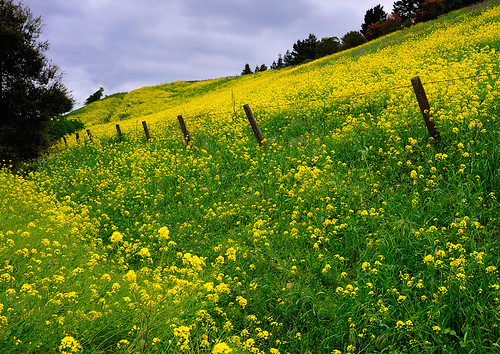
Yellow hills covered with mustard blossoms.
(*photo credit)
June 17, 2018 Bringing Mustard Seed to Fruition
It (kingdom of God) is like a mustard seed, which at the time of its sowing in the soil is the smallest of all the seeds; yet once it is sown grows into the biggest shrub of them all and puts out big branches so that the birds of the air can shelter in its shade. (Mark 4:31-32)
We must recall that this is a parable about the growth of the mighty kingdom of God starting from a tiny beginning; it is more than a gardening lesson interwoven into a parable by Jesus. Once I observed a humble mustard plant in my greenhouse, which normally reaches a height of two feet when flowering; this one continued to grow to be the tallest herb I ever experienced. I remembered this parable and marveled at the height of this unique mustard plant.
The use of biological terms helps us understand how humble beginnings yield to immense endings. Jesus is telling us here to look beyond humble beginnings. Let's reflect when we sow seed, for this is a precious moment when the potential of a future fruition rests in our hands. The world is for us to behold in the tiny creatures, whether a pup, a seedling, or an infant child. In due time, these little ones will grow and that is a part of the miracle of life shown in maturation, and part of the sowers' confidence.
The teachings and healing activities of Jesus would ultimately come to have a global impact, but that would not be seen in his disciples' lifetime or perhaps for centuries afterwards, but the power of the Resurrection includes this gradual growth to a grand future Kingdom of God. We are to sow seed that is small, but can become part of God's glory. We firmly believe it will come to be.
Another aspect is maybe a little far-fetched, namely, our efforts at extending the reign of God allow other creatures to be able to seek and find protection through our efforts. The birds come and rest in the branches. If we sow a plant, this gives comfort to those in need, whether human or the flora and fauna of our world. Our efforts may be more effective than imagined. Perhaps in building up the kingdom of God we discover something about the New Heaven and New Earth -- am eternal structure in the making.
The last aspect really follows from sowing, having a confidence in the maturing process, and being at peace with all creation; this entails basking in the magnificence of God's reign as it is patiently developing. We will participate in bringing about God's reign, not by simply standing and passively watching in awe as the Kingdom unfolds. The farming motif has a special importance, for farmers coax growth from soil through work of human hands. We participate within God's family to help build the Kingdom, as builders not as cheerleaders. Yes, we sow AND we help bring plants to fruition.
Prayer: Lord, help us in projects in which we are involved; give us strength to help them grow into mighty structures to the benefit of all participants in your mighty work.

Sun and sand, beach picnic.
(*photo credit)
June 18, 2018 Enjoying International Picnic Day
Amid the serious aspects of life, we need to take time off and enjoy International Picnic Day. In fact, that is a splendid suggestion as spring draws to a close. Finding the time and selecting the place is most important, for we need to eat meals in the great outdoors in a social setting. Taking such time out has too many advantages to list, and so let's just say yes to picnics without engaging in too much rationalizing.
Local picnics have potential for resulting in pleasant bonding. We say this even with memories of past uninviting weather or insects or disagreeable remarks. Yes, our entire collection of past picnics includes some very pleasant memories. One I remember vividly took place in Alsace on my 69th birthday in the little wine-famed town of Hunawihr, Haut Rhin (France). My brother Frank, sister-in-law Mary and I had cheese, fruit, French bread, sausage, and of course wine in a public gathering place; we observed kids jumping off a low shed nearby with squeals of delight; we were accompanied by wine gatherers washing out their vessels in the late September twilight. We remember certain picnics particularly well, including the place, food and peoples, because we thoroughly enjoyed these memorable events.
International Picnic Day becomes an opportunity to gather those who are of an international community in one place and to celebrate our cultural differences and how these enrich us by their presence. The informal picnic table at park pavilion or the cloth spread on lawn, beach or woodland floor becomes a more perfect form of togetherness, much like Christ telling all to sit down and enjoy the multiplication of the loaves.
The "International" aspect of a picnic can give it a special flavor. New residents will find the picnic a perfect way of becoming part of a community and coming to know neighbors. Cultural dishes can be shared and the ingredients noted and discussed. Barriers of difference evaporate, and the fellowship extends to the fearful and shy. A well-designed picnic gives a chance for added mobility for the restless, and an opportunity to get to know an expanding community. It does not require formal attire or a rigid schedule, for too much planning can be counter-productive. However, picnics are not utterly spontaneous for they require preparation and even additional contact to ensure that the reluctant are willing to come.
Picnics can be successful far beyond expectations. We can have the chance to break out of our troubles and to circulate, move about, relax in the outdoors, allow children to play together, and enjoy the fresh air and sunshine of the last of spring. Tree foliage, possibly berries and nearby wildlife can add a little unique flavor. Let's make picnics memorable occasions. Perhaps a combination with a belated Father's Day celebration might prove worthwhile.
Prayer: Lord, give us opportunities to meet, promote and have picnics to which various groups come and enjoy themselves.

Antlion poses on flower of the Rudbeckia.
(*photo credit)
June 19, 2018 Curbing Climate Change at Low Cost
Many of us swallow the myth that curbing and reversing the warming of our planet comes at a high price. How can we pay to address the global warming and other climate change problems? Nine years ago a study by McKinsey and Company showed that global warming could be kept below the critical 20 C rise at a cost of well below one percent of the global gross domestic product (GDP). The urgency was to initiate this ASAP. Every year of delay adds to the challenge, not only because emissions will continue to grow during that year, but also because it will lock the economy into high-carbon infrastructure.
The world is responding in various degrees of voluntary participation. Results over the past decade has been a mixed bag, but the U.S. current policy drags down the chance of success, even while various American states and regions are doing quite effective projects. Even heavy carbon-imprint nations like China and India are becoming surprisingly responsive. Implementing reduction schedules throughout over 190 countries could still result in reductions in carbon dioxide level by 40% of 1990 values by 2030. This is a reduction level necessary to stave off the worst scenarios (higher temperatures, rising oceans, and more storms) of anticipated climatic change.
Three relatively low-cost factors are worthy of focus:
a) Renewable energy sources (wind, solar, etc.) have decreased in price of production to such a marked degree that they are now competitive with coal and petroleum, even without counting the terrible fossil fuel environmental costs. However, natural gas through new fracking methods has become both a backup fuel in the transition period and an addition to negative greenhouse effects;
b) Energy efficiency is actually a very low-cost application worth still further implementation by many countries including our own. It can reduce 1990 greenhouse gas emissions by more than a quarter and likewise show that it makes business sense to reduce energy use of whatever source still further. Likewise there is a growing awareness of curbing wasteful resource methods; and
c) Deforestation (a major driver of climate change) in developing countries is being reduced in the nations that have been the worst examples of the past (Brazil and Indonesia). Certainly, still more must be done in this arena.
One factor that magnifies the high cost myth is loss of fossil fuel jobs. Yes, numbers of coal miners have plummeted, but the losses have been more than compensated by rapid increases in wind and solar jobs both in manufacturing and in installment and maintenance. Don't forget -- fossil fuel environmental costs are often neglected.
Prayer: Teach us, Lord, to be reasonable in all our practices, to be conservative in use of resources, and to count costs properly.

"Wild petunia," Ruellia caroliniensis.
(*photo credit)
June 20, 2018 Eating Right
In writings several decades ago, the phrase Follow Dietary Guidelines gave the impression that the U.S. Department of Agriculture had proclaimed the last word in diet. However, the food pyramid of that period has been put to rest and a more complex system installed in its place. That is described in current information outlets. Rather, let us attend to diets based on the following "eating right" factors: access to nutritious affordable food; food preferences and tastes; seasonal availability; age and current physical exercise; proximity to cooking facilities or prepared food; sufficient time for food preparation; and personal needs due to allergies, blood pressure, illness and cholesterol levels.
Some of the older guidelines such as the USDA pyramid still apply in general: eat a variety of foods including selections of fruit, vegetables, etc.; maintain an ideal weight since over half of us fall into the category of overweight and beyond; refrain from excessive fats and fried foods; get adequate fiber (whole grains, vegetables and fruits); avoid too much sugar in the many commercial products that appear so tempting; be careful about taking too much sodium; and finally "if you drink alcohol, do so moderately."
* Consider the doctor's advice and treat yourself to a healthier menu on all occasions. We do not want to engage in a debate over the various well known weight reduction diets. If we keep the weight under control, the debate is moot. Americans suffer from a plentiful supply of lower-priced food and fashion their eating according to foods they can afford. Others seldom cook and avail themselves of fast food restaurants with tempting menus, a host of smorgasbords, buffets and all-you-can-eat reasonably-priced places.
* Admit that we change food diets over the years due to new varieties and loss of appetite for certain foods. Now is the time to consider reducing red meat (and all meat for that matter), excessive salt, trans fats, and refined-sugar foods.
* Accept the fact we get older and no longer should adhere to the heavy carbohydrate requirements of youth -- the quick energy fixes. Avoid the impulse to eat what the crowd likes.
* Eat what you grow and grow plenty of healthy vegetables, fruits and herbs. The brassicas are full of needed nutrients and so grow and consume kale, collards, cabbage, broccoli, Brussels sprouts, kohlrabi and cauliflower. Much depends on the creative ways we fix our home-grown produce so that it is fully appetizing for all.
* Snack only on more nutritious food: not beer, sugared soda and chips but plain popcorn, peanuts, fruit and vegetables. It is regarded as healthy to have more frequent eating periods with smaller amounts rather than three (or two) large meals a day.
Prayer: Lord, food means so much to all of us; help us choose the right items and consume them in moderation.

Sun behind clouds over Land Between the Lakes, KY.
(*photo credit)
June 21, 2018 Greeting the Summer Solstice
Today is the longest day of the year in the Northern Hemisphere. For all who cherish sunlight this is the apogee of outdoor activity, whether gardening or driving or hiking (or playtime, if young). Thus it is truly a day northern naturalists of all ages celebrate.
Cancer is the fourth sign of the zodiac, which is entered by the sun on this day. Many of us are unmindful of astrology or the position of Leo, Gemini, or the constellations. But the word "cancer" strikes us for another reason, for the illness elicits fear in all and becomes a life struggle for too many. This form of human misfortune comes in many forms, and thus we feel relieved when declared free through annual checkups. Thank God! Can we believe that physicians of a century ago did not know what lung cancer was -- even though 400,000 will die from smoking-related diseases this year in our country (not all from lung cancer alone).
All of us crave the sun's rays to some degree, for we all need sufficient Vitamin D -- and sunlight triggers its production. Some people are naturally better protected than others, with skin pigment that will allow them to darken easily and not be too affected by the direct sun's rays. Others are fairer skinned and need additional protection (clothing and sun block) from the summer rays. None of us like to hear that too much ultraviolet light could affect the skin, cause it to age and wrinkle, and even trigger skin cancer, which takes its toll. In this country skin cancer is a surprising killer of thousands each year. Get to know about actinic keratoses (AK), basal cell carcinoma (BCC), squamous cell carcinoma (SCC) and malignant melanoma from literature developed by the American Academy of Dermatology <www.aad.org>.
The amount of damage caused by direct sunlight is sometimes disputed. Less debated are the ill effects of tanning salons that are used by people who generally want a winter tan. We don't want to take the trade away from small business people, but such tanning services are questionable. Customers are misguided into thinking that this protective tan gives a sense of well-being and prepares them for beach and boating activity in the coming season. Instead, it can have devastating and irreversible effects on human skin. If one needs a tan, consider using a sunless self-tanning product.
The Golden Rule says, "Do to others whatever you would have them do to you" (Matthew 7:12). In the golden season of sunlight we could resolve to share concerns about skin cancer. Let us each resolve this summer to generously apply sunscreen, wear protective clothing, seek shade, use extra caution near water, snow and sand, and protect children from excess sun rays. Turning one person away from the effects of a tanning salon before it is too late is a worthwhile undertaking. And sincerely greet the Summer Solstice.
Prayer: Oh God, you give us our brother the sun to give us light and warmth and to help make things grow. May we respect this fellow creature and protect ourselves from overexposure to its rays.
A Necessary Discussion of Violence
The demand to redistribute resources to effect greater equality will not come willingly by everyone. The greed that cements the status quo runs deep, and it is realistic to expect that change will be resisted by those who do not want to give up their privileges. Will this be a violent reaction? Even the moral persuasion that "privilege" could mean the first to take the lead and freely give up controlled resources (the First Option of two weeks ago) will most likely fall on many deaf ears. The need to bring about change runs the terrible risk of violence, something that is not always intended, but could occur with some probability. With reference to radical change we could speak of four levels of violence (two operative today and two to be possibly expected). We will not treat violence in the form of individual physical or other abuse that exists in our world and is part of fallen human nature. Some four varieties of systematic violence are:
1. Violence of terrorism. This unsettling form of violence involves ISIS and those distraught and in stages of mental imbalance and despair. No one in a sane state of mind accepts this terrorism as a normal part of a civilized society, and every effort to bring about less of this is being made -- though some socially-devised methods are called into question. Some have attempted to couple the growth of resource inequality with the mental and physical condition of those who plot and execute these terrorist acts. When will the world be rid of such a scourge? Must it await the radical change sought here?
2. Violence of insecurity. The growth of resource inequality perpetuates the inability of those at the lower end of the scale to obtain their proper share. The pot is limited; those in high places control what rightfully belongs to all the people. When a mother has a bare cupboard and cannot feed her children, the insecurity in a world of plenty is violence to the human victims. I have personally observed this in our region. Those who have too much are perpetrators of this violence; unfortunately it is so prevalent that most dismiss hunger, lack of lodging or heath inaccessibility as "normal" or for some "the fault" of the victim. We must come to realize that this is a form of violence that is present in our world and afflicts a billion people, even when percentages leaving the insecurity list in some nations have shown significant growth since the turn of the century (example China and Southeast Asia). Does a capitalist-loving citizenry permit this condition to continue and thus condone such violence? Change is urgent both as to awareness of the condition and the need to redistribute resources to the indigent.
3. Violent reaction to change. The American privileged have such influence that the greatest military in the world could come to their rescue if they lobby for such action to the current Administration. This reaction to change is not far-fetched, given so much for the greedy to lose by redistribution. The material readjustment will be difficult for those with a purely secular outlook, even though those of spiritual outlook may see value and greater security by increased sharing of resources. Note that this violent reaction did not occur around 1990 when the USSR crumbled and new Eastern bloc nations surfaced in the Violet, Orange and other Revolutions. Will the needed demise of the capitalistic inequality occur so peacefully? We pray that this be so, but await the outcome with hope-filled resignation.
4. Resistance to systematic violence. The option to forcefully resist when violence is being perpetrated on helpless victims is to be considered. If an individual is taking advantage of another and is hurting them in some fashion, the means of curbing this violence is more than some verbal suasion. This is part of the discussion of just war and is certainly an area that needs mentioning when terrorism and greed-caused inequity produces current violence of insecurity. To resist may take various forms, but one (in my current opinion) should not rule out physical restraint and even disabling the perpetrator. One does not seek to resist violently and all restraint must be urged, but the possibility of resistance may arise as counter to the reactionary movement of the loss of resource privileges.
Possible alternatives. Is a likely violent reaction by the privileged cause for non-resistance? NO! One cannot defend an unacceptable status quo through the possibility that unwanted reactions could possibly occur. We must act when needed and hope the outcome will be a beneficial and ultimately peaceful one. For those with a spiritual outlook, such steps could come and history has examples of non-violent pathways. To hold over the heads of the poor the possibility that the privileged will strike back using existing military power at their disposal is a threat that must not delay and curtail radical change. The world moves on and the possibility of further violence (when in fact it actually exists right now) cannot hold us back from promoting a redistribution of limited resources with a certain urgency.
The possibility of violent reaction cannot be a deterrence for those who see the need for change; so also the possible violence by victims within the change process should not hold back the needed change. Here I may differ from strict non-violent advocates. I accept the possibility that just resistance to violence can become violent and it may be "necessary" to reduce and curb immediately occurring violent behavior. To allow existing violence of food and other insecurity to continue unchallenged is to condone the current condition and become party to it. While a perfect world would say resist violence through non-violence (and conceive methods that are creative in scope), still the possibility of forceful resistance has an effect of motivating activists and deterring aggressors.
The nature of these non-violent creative ways to radical change is the subject matter of upcoming reflections -- if I can live so long.
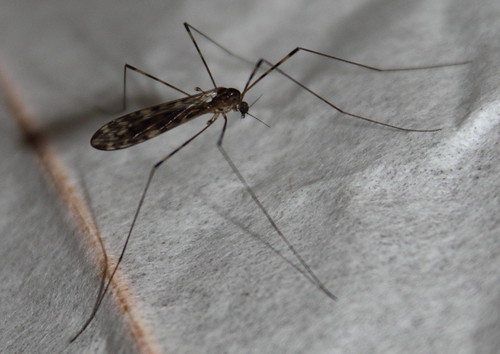
Mosquito perched on ricepaper shade.
(*photo credit)
June 22, 2018 Stinging Summer Insects
Among the unpleasantries of summer, many list all sorts of biting and stinging things. For the most part a good principle is Leave them alone and they will not hurt you -- but how do you tell others who are scared by insects? I find that many stinging insects apart from mosquitoes have to be threatened before directing their venom on hapless individuals. Maybe people should respect insects and not try to swat them or duck and scramble about to avoid them. Stay cool for they do not want to harm you. They sting to fight back, though some wasps and others may be intruded upon accidentally.
While director of the ASPI Nature Center, I took a working tour on the frequently used paths and among scattered buildings to remove wasp or hornet nests before the human traffic began in late spring. This became our record that we had made an effort to remove any possible causes of sudden troubles, should an allergic visitor be stung by a wasp while walking around the grounds. Our hope was, "Don't get hurt and don't harm the wildlife -- and that includes the hornets." Actually the stinging insect that bothered me most was the autumn yellow-jacket that seemed to want all the food one would have at a picnic table. Likewise, stepping inadvertently on one of their nests could make them quite angry. Mud daubers are often mistaken for wasps and eliminated although they are really among our non-stinging friends. Honey and bumble bees will not harm us, if we don't get in their way or threaten them. They are busy, and we are not their pollen-bearing targets. Just get out of their way.
Sometimes we have to deal with stinging insects directly. In the past, my utter respect for hornets too near buildings would make me launch an early morning raid on their nest with a flaming torch, because they can quickly strike back when aroused. Wasp nests were removed by dousing them with diesel fuel or kerosene, far superior to commercial pesticides (and less toxic) and far less costly. When hit by a kerosene squirt or moisture cloud, most of these winged insects will fall straight down. When the application is quickly delivered to the nest, the colony is disposed of in an efficient manner.
Some people may be highly allergic to these bites and should have Benadryl or other safeguards at hand. Highly susceptible visitors to nature settings should carry these remedies in backpacks when on hikes and leave some within easy reach of companions. We had one scare during my quarter of a century in nature work when the wife of a worker visited and had to be taken to the local hospital due to a wasp bite. People differ in how they react to these stinging insects; however, in some cases the allergy or difficulty is said to arrive without any prior experience by the victim. Mainly stay clear of possible nests. Don't be so stupid as to attempt to smell a flower in which a bee is working. A bumble bee bite on the nose can be quite irritating.
Prayer: Lord, teach us to respect all of nature, and especially insects that could hurt us, if we meet them in the wrong manner or the wrong time or place.

An afternoon rainbow behind a cluster of locust trees.
(*photo credit)
June 23, 2018 Staying Alert to Hidden Environmental Problems
Some environmental problems have been addressed with a certain amount of success: airborne sulfur oxides, mercury in water and lead in gasoline. However, other areas are overlooked and these include greenhouse gases that exacerbate problems confronting us today. Among overlooked environmental problems let's consider others:
Space expansion -- The overbuilding of interior commercial, educational, worship, and domestic space in the past three decades has resulted in immense increases in resource demands for heating, cooling, construction and maintenance. We can live in smaller spaces and also can refrain from air conditioning all that gained space.
Exotic Species -- The purchase of and introduction of exotic flora and fauna; these practices have opened the way to spreading abroad of uncontrollable (invasive) pests, which can threaten the native species. This is regarded by some as the most serious environmental problem of the twenty-first century.
More electronic devices -- Everyone must be seen as connected to someone else or they would not be important -- and a proper status symbol includes discarding the older device of a mere five years ago.
Constant social media connection means less and less authentic face to face communication and all its social benefits.
New household gadgets -- In the kitchen an old refrigerator is replaced by a highly efficient one using half of the energy; the old frig is relegated to the garage as a beer storage unit and appliance energy expenditure increased 50%.
Unregulated pets -- The prowling cat can take down many birds over the course of its lifetime; millions of wild animals are lost to the loose felines and canines in our urban and suburban areas, and quite a number of these roam freely without restraint.
Nuclear power -- Several environmental writers have broken with tradition and favor improved nuclear power to counter global warming by carbon-containing fuels. Proponents have included James Lovelock, developer of the Gaia Theory, Stewart Brand, founder of Whole Earth Catalog, and the late Hugh Montefiore, Friends of the Earth trustee.
Continued lawn care -- The move to turn part or all of yard space into productive gardens and orchards is slow in coming. A majority of people prefer to be like neighbors and mow the monocultural lawn grass and water it when drought is threatened.
Unnecessary auto use -- No doubt it takes resources to continue unplanned auto driving when half the trips could be combined or even car-pooled with others. Think twice when preparing to make a trip.
Prayer: Lord, make us alert to how we can address existing and reemerging environmental problems. Make us aware of the times we forget to be green in practice.
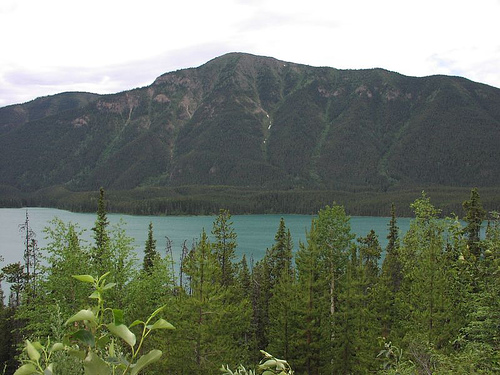
Vivid color of Muncho Lake, British Columbia.
(*photo credit)
June 24, 2018 Imitating John the Baptist
I will make you the light of the nations so that my salvation will reach to the ends of the Earth. (Isaiah 49:6)
The feast of the Nativity of St. John the Baptist falls about once every seven years on a Sunday and this takes preference over the 12th Sunday of Ordinary Time. Thus we celebrate the feast in a special way for this great prophet and hard-to-imitate holy person. Virtually all of us would find it nearly impossible to live in a Judean wilderness on wild honey and grasshoppers, or to wear the coarse clothing of which he covered himself. Apart from specific culinary and lodging conditions, we look more closely and discover some elements in John's life that are meant to connect with us -- and even teach us proper ways of acting:
Joy -- John leaps for joy at the arrival of Mary with Jesus in her womb. We ought to find excitement and happiness upon the arrival of a new person. Do we try to make new arrivals comfortable with a joy-filled hospitality?
Uniqueness -- John's birth is a dramatic event on par with that of Jesus at Christmas through the narrative of his unusual arrival. John withdraws from the world and lives simply as the Spirit calls him to do. Do we follow our own unique calling by the Spirit?
Humility -- John realizes in the presence of Jesus that he is to fade with the rising star of the Messiah coming into full view. We need to be prepared to make ready for others to receive the Lord, and yet accept the fact that our efforts may go under-appreciated or unnoticed. Are we willing to accept that the fruits of our work will come after we have departed this world?
Forthrightness -- John is a free spirit and speaks plainly to the people; he lives simply through both word and deed. John is the right person at the right time and plainly tells others what will happen if they do not reform their ways. Do we speak plainly?
Courage -- John does not hesitate to tell the erring King what he has done wrong in his life -- and for that reason John must take the consequences of imprisonment. Are we willing to speak honestly no matter what the truth may cost us?
Light to Others -- From unusual birth to a martyr's death, John is a forerunner of what we all ought to become, and yet we do not have to imitate him in specifics, only in the qualities that can reappear in our unique time and place. Do we leap with joy at the coming of the Lord, affirm the mystery of life through reverence, live simply so others may simply live, become prophetic and speak out about the need to make changes in our world, and stand willing to witness to what God calls us to be and do?
Prayer: Lord, help us to learn from events in the life of John the Baptist; make us also heralds of Good News in this age.

Parasitic beechdrops, Epifagus virginiana.
(*photo credit)
June 25, 2018 Learning from Custer's Last Stand
I visited the site of Custer's last stand on the 110th anniversary of that tragic event and was filled with sorrow, shame and desolation. The Montana landscape appeared peaceful enough in the rolling treeless hills. The locations of each fallen soldier brought back in imagination the gun smoke, waves of warriors, battle flags, and shouts and curses, all in one. For all these reasons the peace-filled atmosphere gave way to thoughts about senseless conflicts that could have been resolved peacefully. There was much tragedy to the event that took place in Crow reservation territory 142 years ago today. General Custer and his military command were in the process of subjugating the Native Americans of the Great Plains. He had a career with some success in Civil War campaigns, but he overestimated his ability to bring these fiery native people under governmental control. The events on that fateful day were due to his lack of understanding of the forces allied against his small unit.
That massacre was not the only tragedy; a second greater one was that the United States was slow at learning lessons at the one-hundredth anniversary of the Declaration of Independence. The Civil War had been won only a decade before, and the aftereffects were being played out throughout the South. Military solutions were regarded as sure solutions to all social and cultural problems, but that was far from reality. Self-righteousness and a growing sense of progress were intermingled. New inventions such as the telephone and new land acquisitions (Alaska) made the rising Manifest Destiny seem unblemished even in the struggles with Native Americans.
The haughty campaign of subjugation of native tribes hardly paused, for, in a matter of weeks after the Custer defeat, veteran field-tested military companies were brought in and the conquest continued with greater intensity. Forgotten was respect for the Native Americans' rights to land and independence. Had a peaceful solution been truly sought, the fighters at Little Big Horn would not have died in conflict.
Equally tragic is that the Little Big Horn coalition of Native Americans that had successfully resisted Custer was not sustained. Rather it crumbled before the American military might and the Great Plains Native Americans essentially lost their livelihood, their lands, their bison, and their sense of military prowess, which had just been gained in battle. Henceforth the Native American power would retire before the onslaught of the American army. Can anyone celebrate Little Big Horn? Can we learn national lessons from past behavior? Was the event on June 25, 1876, repeated in Vietnam and is it again being repeated in the Middle East? Is the military approach in Iraq or Afghanistan the way to proceed, and does history teach us anything? The Custer's approach was not satisfying then, and it is not likely to be successful today either. Diplomacy is always better than conflict and citizens ought to speak up for -- No more war!
Prayer: Lord, teach us to learn lessons from history and to be fair and willing to settle our differences diplomatically.

Flower of the tulip poplar, Liriodendron tulipifera, state tree of Kentucky.
(*photo credit)
June 26, 2018 Actualizing the Gift of Peace
Unfortunately America is still in a seemingly never-ending conflict. Yes, it is the longest war in our history. We have thousands of military personnel engaged in Afghanistan with no end in sight. When will we again be at peace, or do we rest on military decisions instead of a citizen administration? As a nation we say "peace," but with the vast military-industrial complex do we really want it at all? Warfare is such a part of our economy and culture.
Lasting peace is our hope, even when it often seems so impossible to achieve. We, as individuals and communities, yearn for peace and cry out for it to happen. However, do we question the profit-motivation that builds billion dollar aircraft carriers and fighter planes worth hundreds of millions of dollars? Do we look at the multitude of automatic weapons in this country and the attitudes of a fully armed citizenry? Perhaps we Americans think we have a constitutional right to bear arms; thus we ought to allow only muzzle-loaders that the framers of our constitution considered to be "arms?" There will be far less gun violence if the only arms that citizens could possess were muzzle-loaders. Remove the other guns and the ammo associated with them; certainly Congress would have to contend with a powerful weapons production and marketing lobby along with the National Rifle Association.
Peace is a process requiring patience, ingenuity, and cooperative effort. Perhaps that is more than what citizens unaided by the Spirit can do on their own. Divine assistance is crucial, but we must do our part. To be peacemakers does require our active participation, for we must act in an enlightened fashion -- and must acknowledge the divine source of that enlightenment. Our individual peace begins in the soul and moves out to external expressions, and that fundamental peace that the world cannot give on its own is from God. We find peace with the Lord in the totality of our faith experience, and in an atmosphere of journeying together with others seeking peace. If we are disquieted and our souls are in flux with many anxieties, we are hardly able to initiate and maintain the peacemaking process. God's gift of grace can permeate our stony hearts and turn them into foundations for a peaceful world.
World peace is fragile and easily swept away by violence, selfishness and greed. It takes an enduring love of our fellow human beings to break through the clouds of despair, anxiety and doubt. In order for global peace to be permanent, we must use some of the one and a half trillion dollars consumed each year in defense and military use. Beating swords into plowshares means: feeding the hungry, giving work to the unemployed, treating diseases, and protecting the innocent. "Give peace a chance" is more than a fervent plea. Military planning and weapons' production is simply a pause before the next battle. From non-violence springs true peace, and this could be reflected by a less military-based economy.
Prayer: Lord, let us hear once more, "Peace is my gift to you." Help us to present and popularize viable alternatives to warfare.

An evening hike to explore the Appalachian soundscape.
(*photo credit)
June 27, 2018 Remembering Helen Keller
Helen Keller, born on this day in 1880, overcame her difficulties in a spectacular manner. She was sightless and soundless and yet overcame these immense barriers to traditional education through diligence, enthusiasm, courage and hard work, and the assistance of good patient mentors. We are impressed by people who accept their conditions and can live fairly normal lives, get advanced degrees, go to and from work on busy subways, and act as independent agents even though they are physically challenged in various ways. We hear about handless people who write, play musical instruments and use their computers with their feet. A neighbor near where I grew up lost limbs while in the military and yet came back to civilian life and raised a family and farmed in a rather routine fashion. He gained our deepest admiration and I was privileged to conduct the ceremony at his wedding.
The Helen Kellers of the world make us aware of the gifts we have with limbs and seeing eyes and hearing ears. We can appreciate gifts of sight and mobility given by God, through those who lack some of the normal means of carrying on -- and Jesus said, "He (the blind man) was born so that the works of God might be displayed in him" (John 9:3). The blind and immobile often have a deeper sense of gratitude than those with full use of normal organs and limbs. We need to consider these folks as mentors; they encourage us to overcome minor handicaps, though we often hide, ignore or deny that these handicaps exist. Watching people overcome major hurdles inspires us to tackle our personal problems with renewed vigor. If Helen Keller could sustain high quality life, so can we endowed with seeing and hearing. She is a role model, and we hold her high when some seem discouraged by speech, hearing, learning or social defects.
We tend to blame people as though in blaming them we are excused from doing anything for them. Though the challenged people do not always seek our assistance, we can still be sensitive to their needs and willing to give assistance on occasion. We have much to learn, even how to interact with people who are blind or forced to use wheelchairs or walkers. Each of us will be challenged some day.
Also on Helen Keller's birthday we note the great strides being made to secure physical aids for physically, mentally, emotionally and socially challenged individuals. These technical devices range from computerized word recognition programs to motorized mobile chairs, and from guide dogs to better hearing aids and eye care. A major industry has developed, and engineers have come up with some ingenious inventions. The attention given, in modern design and construction, to handicapped lifts, entrances, restroom facilities and pavements is a result of the American Disabilities Act legislation and implementation. We are more aware of others; we are drawn to assist them through accommodating doorways and elevators.
Prayer: Lord, teach us to see in others, who lack physical gifts that seem so ordinary, that these functions are your gifts to us, for which we need to be ever grateful.

Strawberry moon, June 2016.
(*photo credit)
June 28, 2018 Welcoming the Strawberry Moon
Tonight is a full moon, Strawberry Moon, a regional name for a favorite fruit of the early growing season -- delicious and eagerly welcomed. Strawberries are meant to be eaten fresh or with cream or cereal, or in pies, jellies and jams, ice cream and flavored drinks. Although its taste is so long relished and enjoyed, the humble strawberry triggers both good and bad memories for some of us.
Picking strawberries was fun for awhile. My mother had a strawberry patch for obtaining "pin" money during the Depression years. Being from a family that included accomplished gardeners, she enjoyed growing many things and especially strawberries. We were recruited to assist with berry-picking though in a very busy late- spring farming season. At first the pickings would go well -- five berries to the pail and one down the gullet. In a short while my back ached and my belly began having enough of that wonderful fruit. Physical pain was complicated by family friction as well. Daddy disliked Mama's taking us from the fields to the strawberry patch at one of the busiest seasons of the farm year (haying and tobacco-setting) -- and each spring this required a certain resolving.
Strawberries involve other problems. First their freshness is quite temperamental. Their span of freshness is limited and so the period of picking (they only last a few days ripe on the vine itself), packing and delivery is quite time sensitive. Even with refrigeration, strawberries must move quickly to avoid spoilage. Besides, commercial berries are often covered with pesticides used for completing the process of bringing large, red, ripe strawberries to your table with nice appearance -- and that means using chemicals to help do the job. Furthermore, migrant strawberry pickers accept this back-breaking labor; they must work gingerly in order not to bruise delicate berries. For small farmers, picking is infrequent and unpleasant but also temporary. For the migrant farmers such work, if they are lucky to get it, may go for weeks on end -- and the pay is not that great either.
Eat local strawberries while in season. Since so many enjoy strawberries, some people seek to have them when out of local season -- but is this a green practice? Certainly local seasons can be extended by growing varieties that bear longer or at different times. The purchase of air-freighted berries from Latin America or other parts of the world, and forgetting about carbon print of such extravagances, are certainly not ecological. Being green means using local and seasonal food -- and most of us live where strawberries can be grown only at certain times. Accept the fact that fresh, organic and local strawberries taste better and become a treat for this time of year. Now after the season move on to other fresh items such as blackberries or raspberries, for each has its time.
Prayer: Lord allow us to observe each full moon that comes, to appreciate the season that it ushers in, and to live fully in the enjoyment of that season to the fullest.
Initiate Creative Ways to Non-Violent Change
Urgency to bring a more equable distribution of global and U.S. wealth faces the challenge of devising creative processes that can be effective in a reasonable short period of time. Should the focus be so intense in our limited time that we never consider less important matters? Or do we find the necessity of doing other concerns as part of the creative process? A multi-step process may maintain mental and social balance and stave off the temptation to opt for violent change.
I found it difficult this spring at the 48th Earth day event to condone tree-plantings when the most important issue was the U.S. lack of participation in the Paris Climate Change Accord. However, I was reminded that the tree-planters were showing environmental concern while attempts to change a President caught up with many issues were futile. When priorities are quite high (e.g., an individual or national emergency) the focus is obvious. What is happening when a number of priorities seem somewhat serious but not overwhelming and a bigger one seems so distant that we expect fatigue to appear before the long-range goal is reached? Does creativity mean having a distant goal as part of a long-range process while still permitting intermediate goals that will help bring about the final one? Selected options ought to be considered:
Reform the political parties? Pragmatists might say to concede existing political structure discrepancies and reform the political parties from within. They may argue that the task is challenging but current social media makes the task possible. Granted, but the competition for attention on the media is fierce. What is evident in this decade is that political talking points can add to the chatter, involve false claims, and turn our attention easily to trivial or venial matters and thus give major issues far less attention. Some would hold that the political parties as currently operating are not subject to basic change on the "inequality issue" because candidates of both major parties have had much to gain from the privileged few who patronize them. Furthermore, Citizens United makes corporate contributions so immense and campaigns are so expensive that the current status quo is beneficial to both major parties.
A new party? How can the inequality of resources be addressed within the traditional American political process and yet outside of the two-party system? Can this be done without a political structure or "party" to keep this matter in the forefront? The U.S. two-party system could be challenged and several noble attempts have been made since the Civil War. Is this the time for a possible success? If we regard the need so very great, what more can be done from what Ralph Nader and other green candidates have attempted in recent years; yet each time they have been smothered and not even "allowed" within the national political debate. Do the privileged demand the two-party system as now functioning?
Attract non-partisans to real grievance issue? Is the growing number of independents the sign of new things to come? What the young students in the wake of the mass shooting in Parkland Florida earlier this year have shown us is that a basic dissatisfaction (with existing gun controls) can lead to a massive uprising among affected individuals -- and be effectively joined through social media. These political neophytes have drawn national attention; their grievance is obviously personal and serious since guns (and especially military assault weapons) are far too easily in the hands of crazies. In 2018, high schoolers have made school safety a major issue and capitalized upon it through a variety of walkouts and demonstrations. What is evident is that they operate outside of traditional political systems and they express themselves quite well through a variety of activities. Furthermore, they are opposing a rather sophisticated and Administration-endorsed organization that is influential and quasi-political, the National Rifle Association. They have a message.
New emerging outlook? This brings us to a fresh look at a change in the current economic system with three elements worth further reflection from the youth activities: Do we need to operate within traditional political structures in an age when social media will allow a further ease of communication? Must we have a single type of expression dictated by a vocal few or rather could change occur through a multiplicity of approaches -- and none of them need to be violent? The third point is the behind-the-scene political stance of the privileged few who promote the Citizens United decision (liberal use of corporate money for political purposes); these are focal opponents who actually contribute to the change process by expressing the status quo position very clearly. In fact, the youth have already had an impact on one highly complex issue, and we need to take advantage of their clear insight -- strike when the iron is hot.
There is a question whether the inequality issue’s opportune moment for radical change is right now. Certainly, the issue is tied to the climate change phenomenon that is occurring, namely continued expenditure of fossil fuels and extraction of massive resources. However, the environmental impacts from climate change are more gradual, even while Antarctic and Greenland ice shelves and many glaciers melt at ever increasing rates. Major effects occur but they do not impact the individual citizen with the force of school safety after publicized massacres. It is hard to connect extreme weather events with the environmental deterioration or ultimately with a status quo that hinders needed changes through deliberately prolonging fossil fuel use for profits.
Await or create an opportunity? We must keep our eyes open and discover that opportune moment to bring out the inequality issue and how it fits into the current environmental crisis of climate change. Some may ask whether we should create an opportunity and this is worthy of continued reflection and your comments. Perhaps the answer will surface.
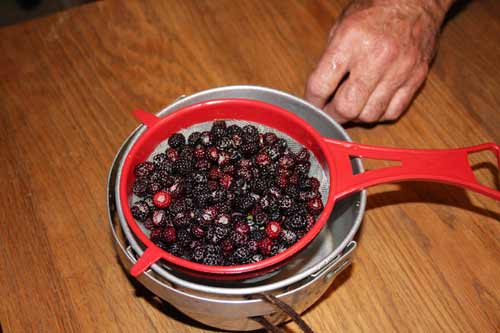
Kentucky wild-gathered blackberries and raspberries, fresh for pie-making.
(*photo credit)
June 29, 2018 Picking Blackberries
Climate change for better or worse is advancing the maturation process in our temperate zone. The early blackberry picker realizes that the first specimens always taste better. Those of us who have our favorite briar patches know that in different places berries will ripen at different times; the blackberry-bearing span can be as long as two months or more -- if we know all the right locations. I find the earliest now well into the second half of June about the time of the end of the wild raspberry ("black cap") season. Appalachian Trail hikers note that elevation changes have much to do with the ripe berry season, which extends over much of summer.
Let's use the term "taste berries," because as we age we find picking many berries to be a chore. Berry picking borders on hard work, even though when young in the Second World War period we could get a whole quarter for a gallon and a dollar for a bucket of berries. At that time in life the monetary incentives always made the thorns, thickets, scratches, sweat, ticks, and occasional black snakes a little easier to endure. Berries were best right off the vine but the picked ones had value as well. I had a dog that liked blackberries, provided I picked them for her -- though her offspring had no use for them. She would be fed from my left hand while I would gather for human consumption with the right hand.
Blackberries take such an effort in older age that we appreciate those who make the effort to pick berries for others -- a most generous gift. Berries in smaller amounts freshen the breakfast cereal bowl or serve as topping on ice cream. In more plentiful quantities, berries can be transformed into a blackberry pie or cobbler; and in still larger amounts they may be turned into homemade jam or jelly. My mother would preserve blackberries whole and these were a delight in the middle of winter, a long time after the growing season. Today, blackberries can be frozen easily, and the melted juice turned into syrup that adds zing to pancakes and biscuits.
Blackberries are so common in much of temperate America that we take them for granted. They are often the first to populate and give a sense of productivity to barren landscapes and cleared land under utility lines. Blackberries are dependable but flourish best in years with adequate moisture and no late frosts. Blackberries are hearty and when we tramp down briars to get to the ripe fruit, the new briars seem to thrive with the added space for next year's crop. The taste of blackberries varies, depending on the portion of the season and the land on which they grow. They are tolerant of both shade and sun. Furthermore, when blooming in May or hanging heavily on the canes, blackberries give beauty to the countryside and a sense of well-being to even the poorest land.
Prayer: Thank You, Lord, for the gift of blackberries, for these humble creatures teach us how we ought to discover our place in the universe -- people with a distinctive inherent richness, who can beautify barren places, and who can offer refreshment to others at certain periods in our lives.

Female northern cardinal, Cardinalis cardinalis, on quince shrub.
(*photo by Sally Ramsdell)
June 30, 2018 Mandating a World Food Reserve
We are facing the largest humanitarian crisis since the creation of the UN. (UN spokesperson on 2017 Horn of Africa famine)
A crime against humanity occurs each time a human being dies from lack of proper food and nourishment; thus the reason for the strong word "mandate" in the title of this reflection. Each day some three thousand unfortunate human beings have their lives cut short because of lack of food -- and others live in luxury and waste food. God forgive us! For many in the world food prices are beyond their reach in times of scarcity. All of this at a time when more and more corn production is geared to making ethanol for gas-guzzling vehicles. God forgive us! Just a single wintery year (these have occurred occasionally in the past) without a major grain harvest would be horrifying for this world's poor. Golden fields of grain are the sign that well-being will be with our world for another year, but the growing Earth's population lives with slim food surplus.
What is one way to address the current malnourished in Africa and several other parts of the world? Ideally the best way is to furnish the malnourished with nutritious, locally grown food. However, in many places drought, war and disruptions cause the need for food to exceed the ability of local farmers to provide sufficient quantities. In such cases as in South Sudan the need for immediately available food is urgent. We would starve waiting for a crop to mature for all need their daily bread. To prepare for urgencies, an emergency grain reserve must exist. In 1981, through the efforts of "Bread for the World" and other groups, the United States set aside a supply of grain exclusively to be used to avert famine around the world. That reserve still exists but is not stored in extensively dispersed areas of the poorer nations where need could or does suddenly arise such as the Horn of Africa.
Storage depots do not come without a price, for they must be built and maintained. Reserves may be a boon to traditional grain producing nations and still harm local producers in the parts of the world targeted for distribution unless a broad-based procurement program is instituted. Filling storage areas with locally-produced grain is ideal but is not always possible. The malnourished can be fed through health clinics, churches, and school lunch programs. The UN World Food Programme could maintain such facilities with cooperation of the host nations. Local farmers are to be supported and corporate ventures in such regions discouraged.
Storage should include more than grain: namely dried beans and other legumes, cooking oil and powdered milk. Gathering, storing, and replenishing as well as distribution in time of need all require proper supervision and protection. Natural and human-produced calamities occur all too often. Short- and long-term food needs exist, and satisfying them takes a major effort at coordination.
Prayer: Lord, teach us to cooperate with all nations in giving to the needy and food insecure people their daily bread.
|